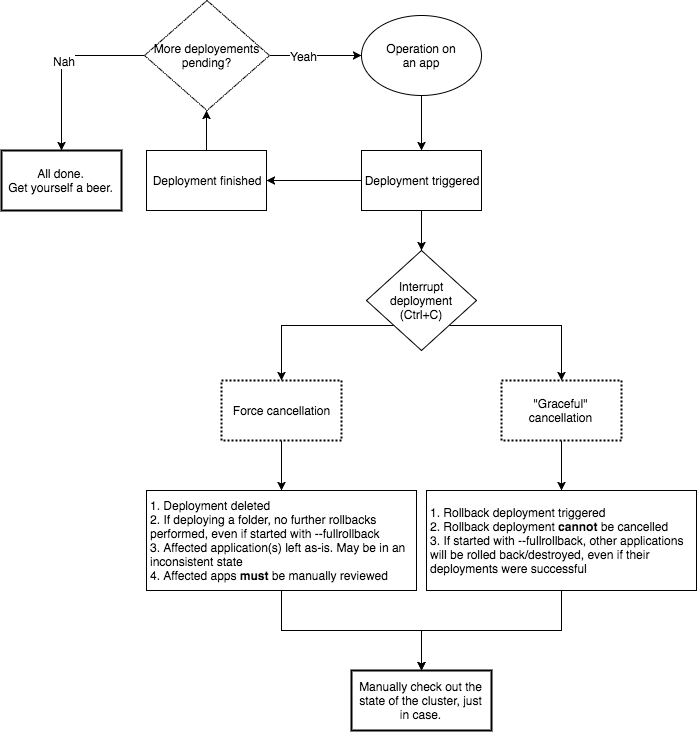Marathon deployment tool
Set up
Development
- Requires Python 3.7 or higher
- Dependencies in
requirements.txt:pip3 install -r requirements.txt - Use of virtualenv is recommended as always
- Highly recommended to use MiniMesos for local testing (feel free to use the minimesosFile)
Options
--marathon: Marathon to connect to. Supports comma-separated hosts:http://m1:8080,http://m2:8080,http://m3:8080. Defaults tohttp://localhost:8080.--appid: Application ID of the app to be affected. Example:/group1/foo/bar--put: May be two values:- Path to a single, .json file, containing the definition of a single Marathon application
- Path to a folder containing a set .json files, each with the definition of a single Marathon application. No recursivity supported. Files starting with '#' are ignored.
- If the .json refers to a pre-existing application, it will be updated
- If the application is to be updated, a backup json will be created (in
./backups/{appid}_{date}.json;backupsfolder will be created if it does not exist)
--fullrollback: If present, the--putparameter is set to a folder, and a rollback is performed (read 'Rolling back' below), all previously created/updated apps are rolled back (if updated) or destroyed (if created) in reverse order (last updated/created will be the first to be rolled back/destroyed). If the initial rollback is forced, this 'full rollback' is not performed.--tag: Only update the Docker tag of a given--appid. As such, only Docker applications are supported.--restart: Restart an application. It's done in rolling fashion: New instances are created, then old ones taken down. No downtime, but requires enough resources in the cluster to fitinstances_amount * 2during deployment--inplacerestart: Scale down and back up an application. Tough way to do a restart: Implies downtime, but has lower resources requirements.--scale: Scale up/down an application.--instances: Get the amount of instances an application has.--list: List all applications in the Marathon cluster and their Docker images/tags--saveapp: [Not implemented] Save a given application's json--dumpall: [Not implemented] Save all applications' jsons
Rolling back
Most operations on Marathon imply a 'Deployment'. Whether is the creation, update, destruction, or restart of an app.
In most cases (except on creation, for now) these deployments can be cancelled (Ctrl+C while waiting for it to finish). When cancelling a deployment, a new deployment is created (the one to roll back to the previous state).
When cancelling a deployment, an option is given: To let it flow (the new rollback-deployment is created) or to force the cancellation (the deployment is killed, and the affected app is left as-is; this is dangerous and the application must be manually controlled afterwards).
If the cancellation is not forced, in turn, this 'rollback-deployment' cannot be cancelled: they are triggered and are not waited for completion, we just move on.
When using the --fullrollback parameter, upon forcefully cancelling a deployment (triggered by a .json read from the folder given with the --put parameter), the rest of the applications are not rolled back. The script just exits and a manual rollback must be performed (the backup jsons may come in handy here).
If you do not force the cancellation (let the rollback deployment flow), the rest of the applications will be rolled back, in the inverse order they were created/updated.
Rollback workflow
Pypi publishing
To releasing a new version, with a valid ~/.pypirc configured for authentication:
- edit the version in
marathon_deploy/version.txt python setup.py sdistpip install twine && twine upload dist/*git commit -am "Version $(cat marathon_deploy/version.txt)" && git tag $(cat marathon_deploy/version.txt) && git push && git push --tags
TODO
- Verify if the target app is a Docker container when using
--tag - Support cancellation of the creation of an app
- Assume
yes(unattended) - On failed deployment, show last task failure message (stderr)
- BUG: --list blows up when there are non-Docker apps in Marathon
- BUG: Ordering is broken with 10> apps (ordering as string, so, for example,
19goes before2) - Standalone building goes into Makefile
